Israel: Opposition leader testifies at Netanyahu corruption trial

Israel's opposition leader testified on Monday in the corruption trial of Prime Minister Benjamin Netanyahu, which would see him removed from office if found guilty.
Yair Lapid appeared in court as a prosecution witness in "Case 1000", in which Netanyahu is accused of granting Hollywood tycoon Arnon Milchan a tax break in return for lavish gifts.
The Yesh Atid party chief spoke about his interactions with Netanyahu in 2013 when he served as his finance minister.
He said he discussed the situation with the premier on two occasions.
"The first time [we met] Netanyahu said to me, 'Did Milchan speak with you about the law?' I told him yes, and he asked, 'What do you think?' I told him, 'I'm not so sure about it,' and he said, [that it's a] 'Good law.'
New MEE newsletter: Jerusalem Dispatch
Sign up to get the latest insights and analysis on Israel-Palestine, alongside Turkey Unpacked and other MEE newsletters
"The second time was the same when Netanyahu asked what was going on [with it], and I said that it's not going to happen, and he again repeated that [it's a] 'good law'," Lapid said.
Netanyahu was charged in 2019 with bribery, fraud and breach of trust in three cases dubbed Case 1000, Case 2000 and Case 4000. He denies all wrongdoing.
In Case 1000, he is accused of allegedly receiving 700,000 shekels ($195,000) worth of gifts given to his wife Sara from Milchan, a famed Israeli Hollywood producer and Academy Award nominee, and Australian businessman James Packer.
Netanyahu, who is Israel's longest-serving leader, says the exchanges of gifts were friendly gestures.
Since returning as prime minister late last year, Netanyahu's new government - described as the most right wing in the country's history - has embarked on a judicial reform programme which critics say could help him evade conviction or see his case dismissed. The prime minister dismissed such suggestions and said he would not intervene in legal proceedings.
The 2019 corruption charges have overshadowed the Israeli political scene and sent the country to the polls five times in less than four years. Each vote has become a de-facto referendum on Netanyahu's fitness to rule.
After losing to a coalition of opponents in 2021, Netanyahu returned to office in December.
Under Israeli law, the prime minister has no obligation to step aside while on trial.
The trial, which has been ongoing since May 2020, has featured more than 40 prosecution witnesses, including some of Netanyahu's closest former confidants who turned against him. Witness accounts have shed light not only on the three cases, but also revealed sensational details about Netanyahu's character and his family's reputation for living off the largesse of taxpayers and wealthy supporters.
According to the current court schedule, the trial is expected to last for another five years.
Middle East Eye delivers independent and unrivalled coverage and analysis of the Middle East, North Africa and beyond. To learn more about republishing this content and the associated fees, please fill out this form. More about MEE can be found here.




